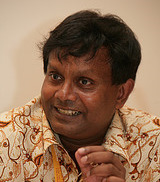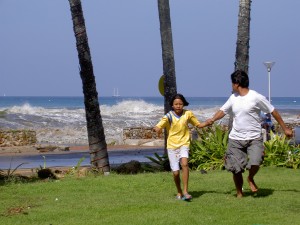Shedding light on the dark side of labor migration in Asia
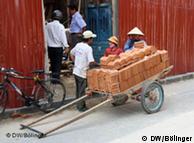 There are about 80 million migrant workers worldwide. We often hear that they have a positive impact on the global economy. For instance, 12% of Bangladesh’s Gross Domestic Product (GDP) is generated by citizens who work abroad in countries such as Bahrain, Saudi Arabia and Malaysia.
There are about 80 million migrant workers worldwide. We often hear that they have a positive impact on the global economy. For instance, 12% of Bangladesh’s Gross Domestic Product (GDP) is generated by citizens who work abroad in countries such as Bahrain, Saudi Arabia and Malaysia.
But researchers like Kalinga Seneviratne say that labor migration from Asia has many hidden problems.
Mr. Seneviratne is the head of research at the Asian Media Information and Communication Centre (AMIC) based in Singapore.
At the Deutsche Welle Global Media Forum in Bonn this summer, Kalinga Seneviratne and other experts discussed how the media can tackle issues pertaining to labor migration.
Talking to Deutsche Welle reporters, the award-winning journalist explains some of the problems migrant workers face, the challenges journalists encounter when reporting such stories and how the media can play a major role in promoting human rights.
Interview with Kalinga Seneviratne
![]() read more
read more
Creating Asian guidelines for user-generated content
The Asian tsunami of 2004 and the Japanese earthquake and tsunami this year were two occasions where broadcasters around the globe relied heavily on user-generated content (UGC). They aired videos people had taken with their mobile phones, pictures snapped with digital pocket cameras or they simply broadcast information users had sent in via e-mail or as text messages from remote places.
These days, many radio and TV stations encourage their audiences to contribute material to their broadcasts. This gives them access to footage professional crews couldn’t otherwise get – or couldn’t get that quickly. And it gives the audience a voice, creating a two-way conversation with the broadcasters and making people feel like the broadcaster is there for them, picking up their stories and addressing their concerns.
Making the most of user-generated content
But how can broadcasters safeguard the quality and suitability of such content? After all, it’s supplied by regular listeners or viewers: amateurs, not trained journalists. Citizen reporters haven’t necessarily been taught the journalistic basics every professional has learned, like how to research facts, how to report accurately and how to be fair to all sides.
![]() read more
read more
Photographer from Bangladesh named winner of the “KLICK!” photo competition
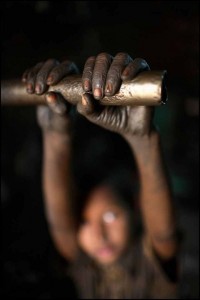 GMB Akash of Bangladesh won first place in the international photo competition called “KLICK! – Your View of Human Rights and Globalization”. The name of his winning picture is “Children’s Hands”. The contest was launched by Deutsche Welle and Amnesty International. The winning photographs were decided by around 1,500 participants at this year’s Deutsche Welle Global Media Forum in Bonn, Germany, which ended on Wednesday, 22 June 2011.
GMB Akash of Bangladesh won first place in the international photo competition called “KLICK! – Your View of Human Rights and Globalization”. The name of his winning picture is “Children’s Hands”. The contest was launched by Deutsche Welle and Amnesty International. The winning photographs were decided by around 1,500 participants at this year’s Deutsche Welle Global Media Forum in Bonn, Germany, which ended on Wednesday, 22 June 2011.
Of his winning shot, photojournalist GMB Akash says, “It shows eight year old Munna who works in a rickshaw factory in Dhaka, Bangladesh. The boy earns about 500 taka (7 U.S. dollars) a month, working 10 hours a day. When production often stops due to lack of electricity, he has time to play. It is common in Bangladesh for children of poor parents to work in various hazardous and labor-intensive
First Place Winner: “Children’s Hands” by GMB Akash
workplaces to support their families. Seventeen and a half percent of all children aged between 5-15 are engaged in economic activities. The average child worker earns between 400 to 700 taka per month, while an adult worker earns up to 5,000 taka per month.” One U.S. dollar equals about 70 taka.
![]() read more
read more
Different perspectives benefit all of society
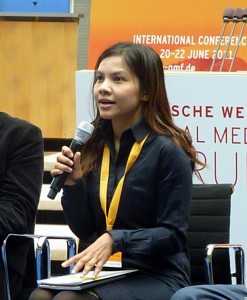 Media rights advocate Supinya Klangnarong from Thailand spoke during a panel discussion on advocacy versus objectivity at this year’s Deutsche Welle Global Media Forum in Bonn, Germany. The three-day conference in June focused on the role of the media in the context of human rights and globalization.
Media rights advocate Supinya Klangnarong from Thailand spoke during a panel discussion on advocacy versus objectivity at this year’s Deutsche Welle Global Media Forum in Bonn, Germany. The three-day conference in June focused on the role of the media in the context of human rights and globalization.
Klangnarong is vice-chair of the Campaign for Popular Media Reform (CPMR), a national NGO working towards the democratization of communication. She is also a board member of the Thai Netizen Network, an independent network of Internet citizens working to uphold cyber liberty in Thailand.
![]() read more
read more
Media’s role in communicating sustainable development
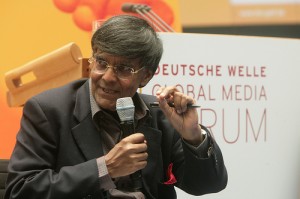 At this year’s Deutsche Welle Global Media Forum, which took place from June 20-22 in Bonn, Germany, sustainable development expert Mohan Munasinghe recommended that the media help spread the word to the world’s elite that it’s in their own interest to limit consumption and allow the poor to grow out of their poverty. In terms of resources, the “more the rich consume, the less there is for the poor,” he said. Otherwise the entire global system is at risk of collapse with unforeseen consequences for everyone.
At this year’s Deutsche Welle Global Media Forum, which took place from June 20-22 in Bonn, Germany, sustainable development expert Mohan Munasinghe recommended that the media help spread the word to the world’s elite that it’s in their own interest to limit consumption and allow the poor to grow out of their poverty. In terms of resources, the “more the rich consume, the less there is for the poor,” he said. Otherwise the entire global system is at risk of collapse with unforeseen consequences for everyone.
As vice chair of the Intergovernmental Panel on Climate Change, Mohan Munasinghe shared the Nobel Peace Prize with Al Gore in 2007. Currently he is chairman of the Munasinghe Institute for Development (MIND) in Colombo, a professor of sustainable development at the University of Manchester in the U.K., a distinguished guest professor at Peking University and honorary senior adviser to the government of Sri Lanka. He is widely recognized as having introduced a framework called sustainomics to make development more sustainable.
![]() read more
read more



